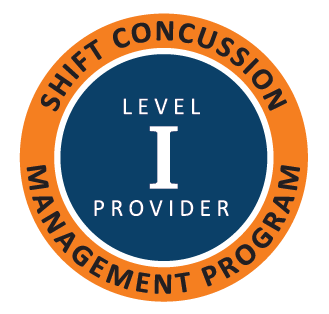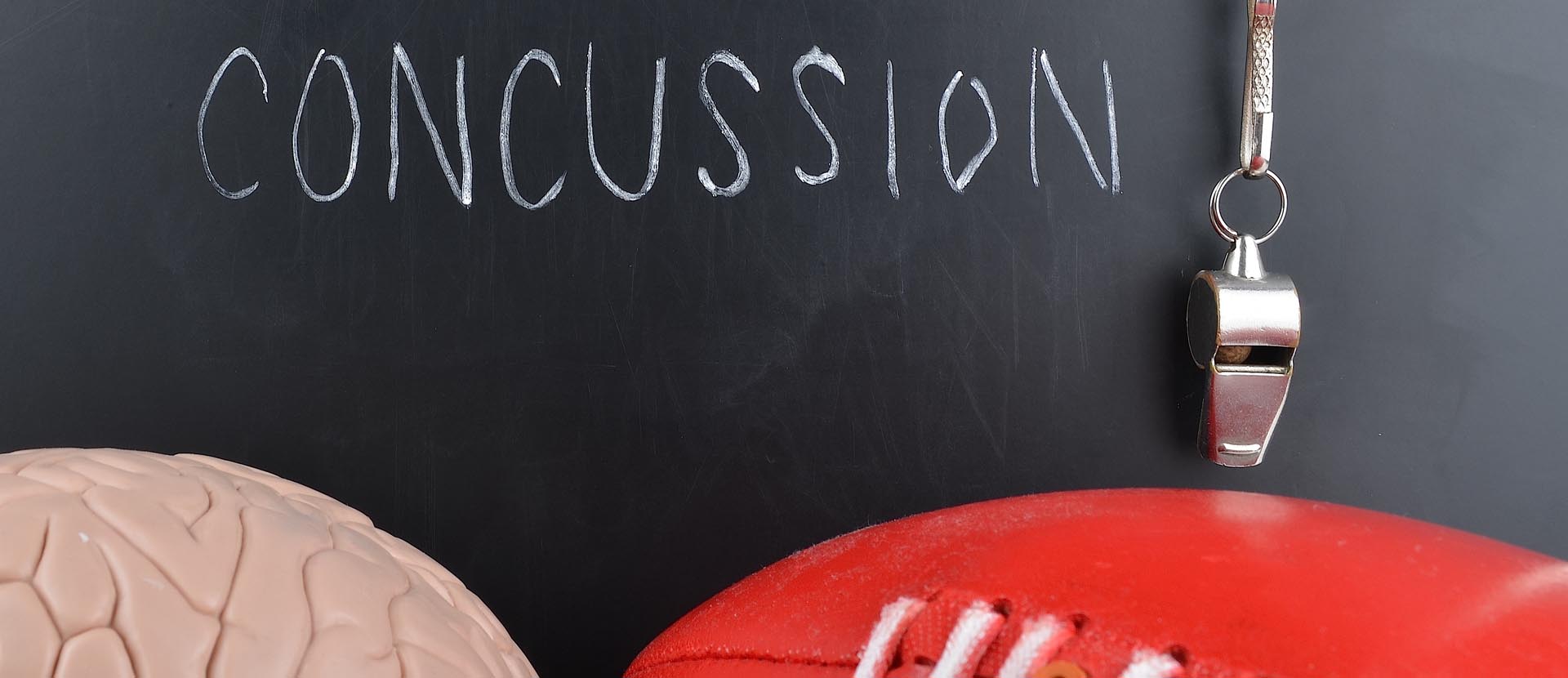What is a Concussion?
A concussion is described as "a complex pathophysiological process affecting the brain, induced by traumatic biomechanical forces". A concussion changes the way our brain functions and causes it to work less optimally. It may be caused either by a direct blow to the head, face, neck or elsewhere on the body with an "impulsive" force transmitted to the head (such as whiplash). A concussion may or may not involve loss of consciousness, in fact, less than 20% of concussions result in a loss of consciousness. It is a serious form of head trauma that requires proper attention and care to prevent further injury and long term impairment.
What happens to the brain during a concussion?
When the brain undergoes a direct (hit to the head) or indirect (whiplash) blow, it can cause the brain to accelerate then rapidly decelerate within the skull. This acceleration/deceleration motion can induce mechanical changes to the nerve fibers (axons)– causing them to stretch – and in turn, alter several important pathways including the leakiness of the cell membranes and imbalance of ionic shift. The brain is in a state of metabolic dysfunction. In addition to the stretching of the axons, concussive events result in decreasing the cerebral blood flow (vasospasm). This reduced blood flow can last from 7 to 14 days in adults or up to 30 days in adolescents. Though the injury is apparently given the spectrum of symptoms experienced by a concussed patient, no structural damage is typically evident on standard imaging techniques such as MRI or CT scans. Instead, these imaging methods are used to rule out more severe trauma such as bleeding within the brain, or fractures of the skull or neck.
What are some Concussion signs/symptoms?
Some common symptoms often reported with concussive injuries include:
- Headache
- Dizziness
- Neck pain
- Nausea or Vomiting
- Loss of balance
- Poor coordination
- Trouble focusing on objects or words
- Poor concentration
- Feeling "foggy"
- Confusion
- Sensitivity to light and noise
- Amnesia, or poor memory
- "Flashing lights"
- Blurred or double vision
- Seeing "stars"
- Irritability or emotional changes
- Ringing in ears
- Slow to follow direction
- Easily distracted
- Drowsiness/fatigue or low energy
- Difficulty falling asleep
What should you do if you think you may have a concussion?
Concussion sometimes can be difficult to properly recognize given the wide range of symptoms and individual responses. Symptoms of a concussion can usually be associated to other conditions, to complicate things further. The appearance of symptoms may be delayed for several minutes or even hours after the initial injury. If you are displaying one or more of the symptoms listed previously, and there was an incident or trauma involving direct or indirect contact to the head, you have to treat it as a concussion.
In an event that a suspected concussion does occur during the game, STOP playing immediately! It is recommended that you consult your Family or Sport Physician as early as possible for medical evaluation. Most sport-related concussions do not require emergency care.
It is important that you remain under close observation over the first few hours following the injury. You should not be left alone or allowed to drive.
If any of the below urgent medical care symptoms (RED FLAGs) present, you should go to the emergency room:
- Progressively worsen headaches or 10/10 head pain
- Seizures
- Severe neck pain
- Grossly unusual behavior
- Very drowsy, can't be awakened
- Can't recognize people or places
- Repeated vomiting (multiple episode > 2)
- Slurred speech
- Significant irritability
- Weakness/numbness in limbs – progressive neurological decline or focal neurological deficit
- Less responsive than usual
- Increasing confusion
- Significant unsteadiness and coordination issue or progressive worsen
In addition to consulting your medical doctor, it is recommended that you book an appointment with a physiotherapist who has special training in concussion management for further assessment and management. You do not have to see your physician prior to attending physiotherapy.
What to expect to see our trained physiotherapist?
If you have been diagnosed by a physician with a concussion recently, suspect a concussion, or if you feel that you have residual symptoms from a previous injury that result in concussion symptoms, due to injuries including a motor vehicle accident, a sport injury, at work, a slip and fall, or any other way, you may benefit from our concussion management program provided by the trained/certified physiotherapist in our clinic.
On your initial visit, a comprehensive concussion assessment will be carried out by the physiotherapist. In order to find out your exact clinical problems and impairments, the assessment includes a detailed clinical history, a thorough physical examination with concussion-focused, and multiple tests screening for the possibly involved systems. The level of impairment and needs of each patient at the initial assessment will be individualized, and all components of the examination do not have to be completed on the first visit. The physical examination may include:
- Gross neurological screening
- Cervical exam
- Vestibular and oculomotor screening
- Balance screening
- Autonomic where applicable
- Specific testing where applicable
Based on the assessment and testing result, the physiotherapist will put together a personalized treatment plan tailored to your symptoms/problems, activities, and lifestyle. Recovering from a concussion can be a difficulty and frustrating time for some cases. We understand that each patient is affected differently and as such, requires individualized care. The following management strategies will be employed tailored to your symptoms, activities and lifestyle:
Education
Education about the injury and concussion pathophysiology, individualized resting strategies, sleep hygiene and energy conservation for recovery and home instruction. For example, during the very early recovery stage, you are recommended to limit the activities that demand the most energy, attention, concentration and visual effort; such as TV, mobile devices, computer, video games, especially in the first 48-72 hours. Basically eliminating screen time in the acute stage to conserve energy needed for the healing brain. Other information may include strategies of sleep hygiene, energy management strategies for your work/school tasks and activities as well as other daily activities.
Specific Recommendations About Employment or Academic Demands - Return to School Accommodations and Return to Work Modifications.
Based on your functional status and clinical finding, the physiotherapist will provide advice and recommendation about schedule regulation, daily life activities, work obligations, school and sport participation where required.
Treatment and Rehabilitation for the Neck.
It is likely that with the mechanism of your injury, you may also suffered from neck strain/whiplash. This problem is usually needed to address earlier in the rehabilitation. The treatment will be including manual therapy, physiotherapy modalities, and other therapy methods to address the associated complaints (neck pain, whiplash etc.). The rehabilitation for the neck is armed to reduce muscle tension, improve joint mobility/range of motion and reduce pain. You may also complete exercises in the clinic and at home to help improve strength and overall function.
Vestibular
Ocular Rehabilitation for dizziness, motion sensitivity, balance disorders, and visual complaints. With suffering from concussion, the vestibular system and visual system, which work in an interconnected fashion to give you a moment-to- moment sense of your position in space and an accurate perception of your surroundings, may be affected and not working optimally and effectively. The dysfunction of these systems may result in difficulty to tolerate motion (yourself or objectives around you), busy space- like the grocery store, difficulty to carry out visual tasks such as reading and writing.
Once you have completed your concussion assessment, you will have a follow up appointment to review your assessment results and get you started on your rehabilitation program. Depending on what type of symptoms you are experiencing, your rehabilitation will focus on a series of exercises for the vestibular system, visual system, or a series of both. These exercises may be physical including agility, eye-tracking and balance drills, or be more cognitive in nature such as reading, word or image identification and memorization. These exercises may provoke some dizziness/symptoms, but it is important to expose yourself to these sensations in order to overcome the "error-signal" your brain is experiencing.
Exercise/Activity - Based Rehabilitation
New research suggests that gentle aerobic exercise initiated even in the acute (early) stage of concussion recovery may be beneficial. That said, it should be applied at an appropriate level of intensity (not too strenuous, sub-symptomatic), and involve activity that is suitable to your preferences and fitness level. In some cases, exercise may be applied in the clinic under supervised conditions, and other times a program may be prescribed for you to carry out at home.
Physical exertion testing may be carried out as needed. Exercise plans and protocol for gradually returning to sport or an active lifestyle will be implemented. The reason for some individuals recovering more quickly and others is unclear. Even when symptoms resolve quickly, it is advisable that a proper gradual return-to-play protocol be carried out for athletes in order to return to sport.
Referral for Additional Forms of Care
Your treatment will be provided primarily by our trained and certified physiotherapist. However, should your symptoms indicated and the need arises, you may be referred to another professional within the multidisciplinary team (eg. Medical, Optometric, Psychological/Neuropsychological, etc.).
Most concussions resolve within a short time-frame but some may persist up to a month or longer. A small percentage of individuals may go on to experience Post-Concussion Syndrome - a term used to describe the persistence of concussion-related symptoms beyond the expected recovery time-frame. it is important that you undergo a proper medical assessment in order to better understand your situation and take the proper steps to recovery.
Kelvin has been trained and certified with Shift Concussion Management Program. He also has extensive training and experiences in vestibular rehabilitation over the years. Should you have any further questions regarding concussion and its management, please call our clinic (403 272-9628) to discuss and book an appointment with Kelvin Cai (PT). We can help!


